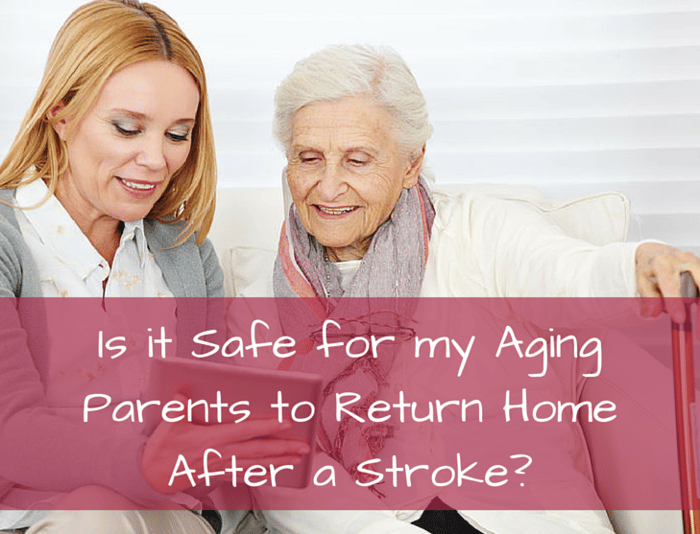
Strokes are not uncommon among the elderly. If one of your aging parents has had one, you may be wondering if it is safe for them to return home after the hospital or rehab center discharges them. Usually, your parent's doctor and/or rehab specialist will let you know upon discharge whether there needs to be someone at home with your parent at all times or not, and what, if any, aides and ongoing therapy they may need. But if you’re not 100% certain what needs to be done, make sure to ask questions — before bringing your parent back to their home. You want to feel comfortable leaving them there. The urge to have them come live with you may be strong, but this may not be the best solutions, especially as your parent may wish to retain their independence. Getting your questions answered will make you feel better about your parent's situation.
To give you some extra assurance, here are some things you should know about stroke — and how you can tell if your parent is safe to return to their home and live independently once more.
Most Stroke Survivors Are Able to Return Home
It is important to remember that many stroke survivors are perfectly able to return to their homes and independent living. Your parent is not unusual in that regard. If the doctor says they are able to live on their own, then you can be reasonably confident that it is true.
Once your parent is home, make sure that their home is a safe environment, make arrangements to get them to and from any additional outpatient rehab therapy they need to attend, and ensure they are engaging in healthy living habits that will minimize their chances of having another stroke. With these things in place, you can be confident your parent will do just fine being on their own, if that is what they prefer.
Don’t Judge Your Parent’s Recovery by Another Survivor’s Standards
Your parent's needs are going to be different than those of any other person you know who has survived a stroke. Strokes affect different people in different ways. What one person may need, in terms of therapy and changes to their home environment, to make a good recovery and live alone again will be different than what another person needs. No two stroke survivors are alike.
Your parent may be able to go home right from the hospital and be perfectly fine. On the other hand, your parent may need to spend time in a short term rehab program. Time spent in rehab also varies by each stroke survivor. Some people may only need to be there a few days, while others may need weeks, or even months there before they are cleared to return home. Some may need to live with someone or have a nurse or physical therapist visit them at home for the indefinite future. Others may need to remain in an assisted living home. If your parent does need to go to into assisted living, either for a short stay or forever, it is important to choose one with an excellent reputation and with specialists who know how to work with stroke survivors.
A Few Home and Lifestyle Changes Are Usually Necessary and Can Make a Big Difference for Your Parent
The vast majority of stroke survivors will be able to go home in some capacity. Depending on your parent's condition, you may need to help them make some adjustments to their home and lifestyle so they can live safely on their own. This could mean making sure they only wear flat shoes or non-skid socks, that they have walking assistance devices like walkers and canes available at home (and that they use them), and that they faithfully perform their prescribed exercises, if they have any.
Any loose carpets should be removed and replaced with safer ones, and all debris in walking paths from room to room should be moved. You may need to install hand rails on stairs or in the bathtub/shower, a raised toilet seat, a tub bench, or even a seat lift to assist you parent in getting up and down the stairs. Even if your parent doesn't need a wheelchair, you may need to install a ramp for them to avoid stairs to get in and out of the house safely.
Speak with your parent's doctor as soon as possible so you know whether these need to be installed prior to your parent returning home. When you and your parent's doctor work together, and your parent is on the same page with you and their care team, you can be confident they can return home to independent living safely.












